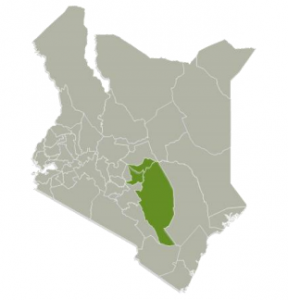| CATEGORY: | CSO |
| CSA PROJECT: | Climate Smart Agriculture |
| SCALE: | County coordination actions |
| LOCATION: | Embu, Tharaka Nithi, Kitui |
| PERIOD OF THE PROJECT: | 2 years |
| GRANT SIZE OF THE PROJECT: | KES 28,000, 000 |
TROCAIRE

Summary of Actions
Trocaire started working in Kenya in mid 1970s and it focuses on developing sustainable communities, supporting gender based violence victims, promoting democracy and helping communities prepare for and respond to natural disasters. Key organization activities include; training farmers on permaculture farm designs and zoning, water conservation structures such as terraces, soil management measures, agro ecological practices such as food forestry and establishment of demo farms where farmers go to learn all about CSA approaches and practices.
Context
Kenya’s agriculture is mainly rainfed and therefore highly vulnerable to the changing climatic conditions.The most vulnerable region are the arid and the semi arid regions.Trocaire implements its CSA projects through partners in Kitui, Ishiara, and Tharaka Nithi. The three project sites are classified under Arid and Semi Arid Lands (ASALS), given their climatic conditions e.g minimal to no rainfall which makes rain dependent farming almost impossible. The only way to ensure food security in these areas is through CSA implementation.
Objective
The objective of the project is to support the most vulnerable in the drought affected areas to attain food security through Climate Smart Agriculture (CSA).
Key Interventions
| FARM LEVEL | TARGET (NO OF FARMERS) | INDICATORS MONITORED |
| Soil management | 11,000 | – Number of farmers trained on soil management skills Number of farmers who adopt soil management techniques |
| Agroforestry | 11,000 | – The number of farmers trained on agro ecological techniques – The number of farmers who adopt agro ecological techniques |
| Promotion of drought tolerant crops |
11,000 | -The number of farmers issued with drought tolerant seeds – The quantity of harvest from drought tolerant seeds – The quantity of harvest sold from the drought resistant seeds – The quantity of seeds stored to be used in the next planting season |
| Livestock feed management | 11,000 | The number of farmers who have adopted feed management techniques |
| Climate smart livestock practices |
11,000 | Number of farmers issued with improved breeds of livestock the number of offspring from the improved breeds for continuity |
| Smart water management | 11,000 | The number of farmers trained on smart water management The number of farmers who adopt smart water management |
| Disease and pest management |
11,000 | The number of farmers who have been trained and adopted disease and pest management practices |
| Waste management | 11,000 | The number of farmers trained on waste management |
| Renewable energy | 11,000 | The number of farmers who have adopted the use of renewable energy |
| BEYOND FARM LEVEL | TARGET BENEFICIARIES | INDICATORS MONITORED |
| Gender (Youth and Women inclusion in CSA) | 11,000 | -The number of women, men, and youth who participate in and benefit from the project activities |
| Policy and Advocacy | 11,000 | Evidence of integration of agro-ecology into county government planning and budgeting |
| CSA based access to markets and value chains |
11,000 | The number of community based marketing groups formed The quantity of green grams aggregated to be sold |
Participation In Key Climate & Agriculture Networks
The organisation is a member of Coopération Internationale pour le Développement et la Solidarité
(CIDSE) and Inter Agency Working Group (IAWG).
Involvement in CSA
Relevance of CSA MSP to Work
- Research
- Policy formulation
- Knowledge dissemination
- Technology transfer
- Coordination and networking
- Communication
- Financing climate smart agriculture actions
- Information about CSA
- Networking
- Learning and exchange
- Reporting and showcasing
- Influence policy environment
Recommendation On Ways To Support MSP
- Dissemination of climate smart agriculture knowledge and technologies
- Developing capacities of key actors involved in climate smart
- Mobilizing actors and facilitating dialogue on climate smart agriculture issues/actions
- Monitoring, evaluation and audit of climate smart agriculture aspects to enhance accountability
- Coordination of actions.
Lessons Learned and Challenges in Implementation of CSA Project
Community based organizations are better placed in marketing the farm products compared to marketing individually. Some of the challenges include persistent drought in our project areas in the recent two years which made the implementation of activities difficult especially those that require water; aggregation of grains proved difficult given the vulnerability of the target beneficiaries and their urgent need for money and low farm gate prices and limited access to other markets rather than the local ones. Some of the achievements realised are agro high adoption rate (90%) of ecological practices; Sources of income have increased due to the nature based enterprises.
Relevant Links & References
Organisation Information and Contact Address incase of Follow Up
Name: Denis Kioko
Email address: Denis.Kioko@trocaire.org
Phone address: +254 734317856
Organisational Website: https://www.trocaire.org/
